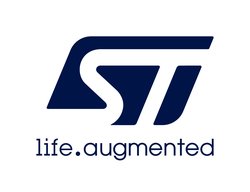NUCLEO-F207ZG
STM32 Nucleo-144 development board with STM32F207ZG MCU, supports Arduino, ST Zio and morpho connectivity
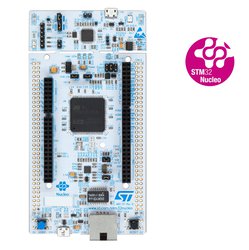
Overview¶
The STM32 Nucleo-144 board provides an affordable and flexible way for users to try out new concepts and build prototypes with the STM32 microcontroller, choosing from the various combinations of performance, power consumption and features. The ST Zio connector, which is an extension of Arduino™ Uno, provides access to more peripherals and ST morpho headers make it easy to expand the functionality of the Nucleo open development platform with a wide choice of specialized shields. The STM32 Nucleo-144 board does not require any separate probe, as it integrates the ST-LINK/V2-1 debugger/programmer and it comes with the STM32 comprehensive software HAL library, together with various packaged software examples, as well as a direct access to the ARM®mbed™online resources.
Microcontroller features¶
- Core: ARM® 32-bit Cortex®-M3 CPU (120 MHz max) with Adaptive real-time accelerator (ART Accelerator™ allowing 0-wait state execution performance from Flash memory, MPU, 150 DMIPS/1.25 DMIPS/MHz (Dhrystone 2.1)
- Memories
- 1 Mbyte of Flash memory
- 512 bytes of OTP memory
- 128 + 4 Kbytes of SRAM
- Flexible static memory controller that supports Compact Flash, SRAM, PSRAM, NOR and NAND memories
- LCD parallel interface, 8080/6800 modes
- Clock, reset and supply management
- From 1.8 to 3.6 V application supply+I/Os
- POR, PDR, PVD and BOR
- 4 to 26 MHz crystal oscillator
- Internal 16 MHz factory-trimmed RC
- 32 kHz oscillator for RTC with calibration
- Internal 32 kHz RC with calibration
- Low-power modes
- Sleep, Stop and Standby modes
- VBAT supply for RTC, 20 × 32 bit backup registers, and optional 4 KB backup SRAM
- 3 × 12-bit, 0.5 μs ADCs with up to 24 channels and up to 6 MSPS in triple interleaved mode
- 2 × 12-bit D/A converters
- General-purpose DMA: 16-stream controller with centralized FIFOs and burst support
- Up to 17 timers
- Up to twelve 16-bit and two 32-bit timers, up to 120 MHz, each with up to 4 IC/OC/PWM or pulse counter and quadrature (incremental) encoder input
- Debug mode: Serial wire debug (SWD), JTAG, and Cortex-M3 Embedded Trace Macrocell™
- Up to 140 I/O ports with interrupt capability:
- Up to 136 fast I/Os up to 60 MHz
- Up to 138 5 V-tolerant I/Os
- Up to 15 communication interfaces
- Up to 3 × I2 C interfaces (SMBus/PMBus)
- Up to 4 USARTs and 2 UARTs (7.5 Mbit/s, ISO 7816 interface, LIN, IrDA, modem ctrl)
- Up to 3 SPIs (30 Mbit/s), 2 with muxed I2 S to achieve audio class accuracy via audio PLL or external PLL
- 2 × CAN interfaces (2.0B Active)
- SDIO interface
- Advanced connectivity
- USB 2.0 full-speed device/host/OTG controller with on-chip PHY
- USB 2.0 high-speed/full-speed device/host/OTG controller with dedicated DMA, on-chip full-speed PHY and ULPI
- 10/100 Ethernet MAC with dedicated DMA: supports IEEE 1588v2 hardware, MII/RMII
- 8- to 14-bit parallel camera interface (48 Mbyte/s max.)
- CRC calculation unit
- 96-bit unique ID
Nucleo features¶
- STM32 microcontroller in LQFP144 package
- Two types of extension resources:
- ST Zio connector including: support for Arduino™ Uno V3 connectivity (A0 to A5, D0 to D15) and additional signals exposing a wide range of peripherals
- ST morpho extension pin header footprints for full access to all STM32 I/Os
- On-board ST-LINK/V2-1 debugger/programmer with SWD connector:
- Selection-mode switch to use the kit as a standalone ST-LINK/V2-1
- USB re-enumeration capability. Three different interfaces supported on USB: virtual COM port, mass storage, debug port
- Flexible board power supply:
- 5 V from ST-LINK/V2-1 USB VBUS
- External power sources: 3.3 V and 7 - 12 V on ST Zio or ST morpho connectors, 5 V on ST morpho connector
- USB OTG or full-speed device with Micro-AB connector (depending on STM32 support)
- IEEE-802.3-2002 compliant Ethernet connector (depending on STM32 support)
- Three user LEDs
- Two push-buttons: USER and RESET
- LSE crystal:
- 32.768 KHz crystal oscillator
- Comprehensive free software HAL library including a variety of software examples
- Support of wide choice of Integrated Development Environments (IDEs) including IAR™ , Keil® , GCC-based IDEs, ARM® mbed™
Board pinout¶
Pins Legend¶
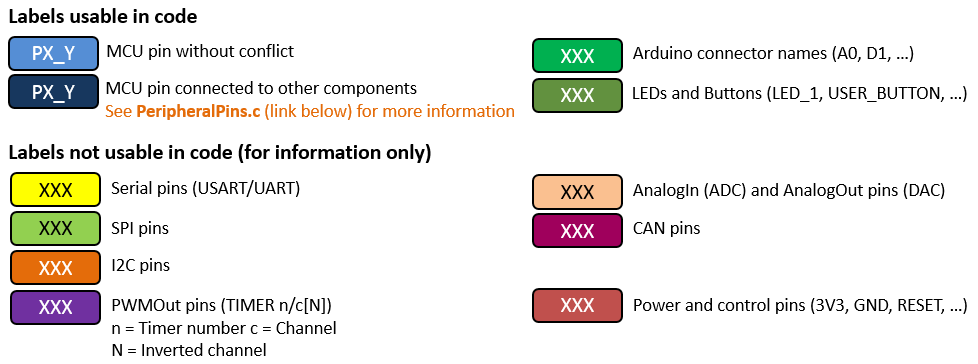
You can find more details on the available pins and labels in the PeripheralPins.c and PinNames.h files.
These files can be found in:
- ARMmbed/mbed-os repository on GitHub (up-to-date version, used with mbed CLI commands)
- mbed-dev library in developer.mbed.org (source files of the mbed library used on mbed compiler IDE)
Zio and Arduino-compatible headers¶
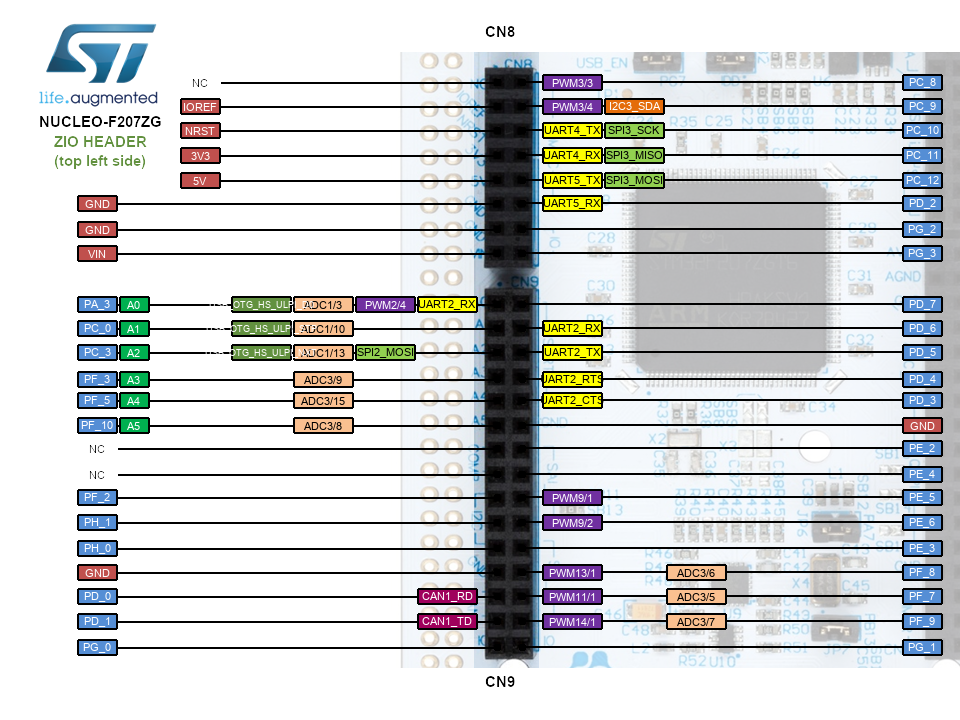
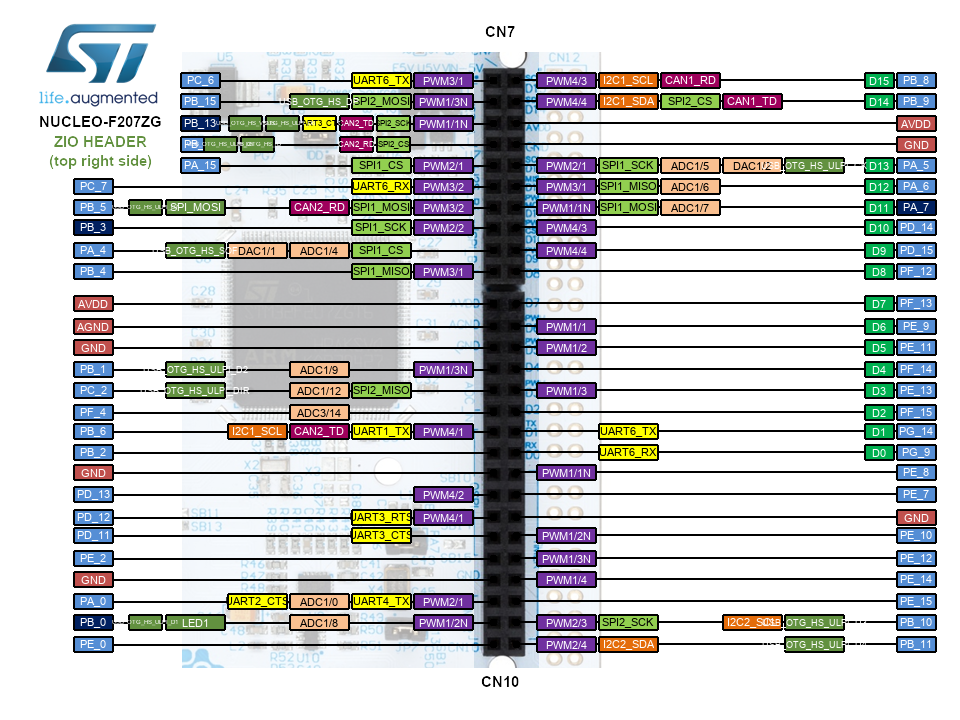
CN11 CN12 headers¶
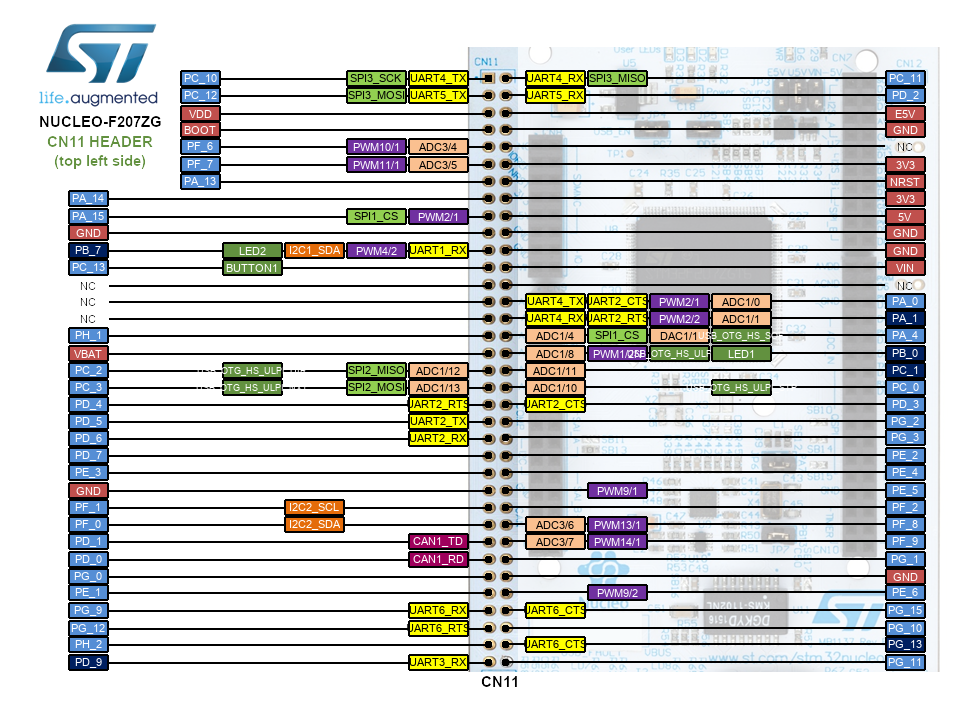
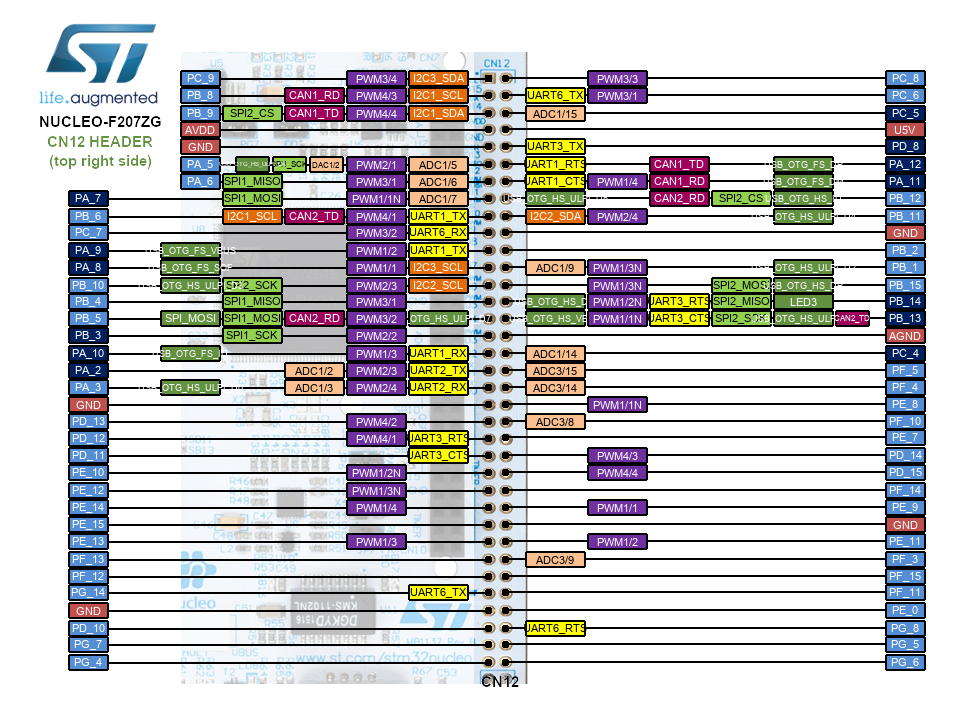
Getting started¶
This video shows how to get started with ARM mbed Integrated Development Environment using STM32 Nucleo platform:
Supported shields¶
ST X-NUCLEO boards¶
Other Non-ST boards¶
See here.
Technical references¶
For more information, please refer to:
Known limitations¶
The following section describes known limitations of the platform. Note that general issues are tracked into the mbed repository available on GitHub.
- Conflict between Ethernet and SPI pins on Arduino D11
See HERE
Tips and Tricks¶
Find more information in ST WIKI pages.

